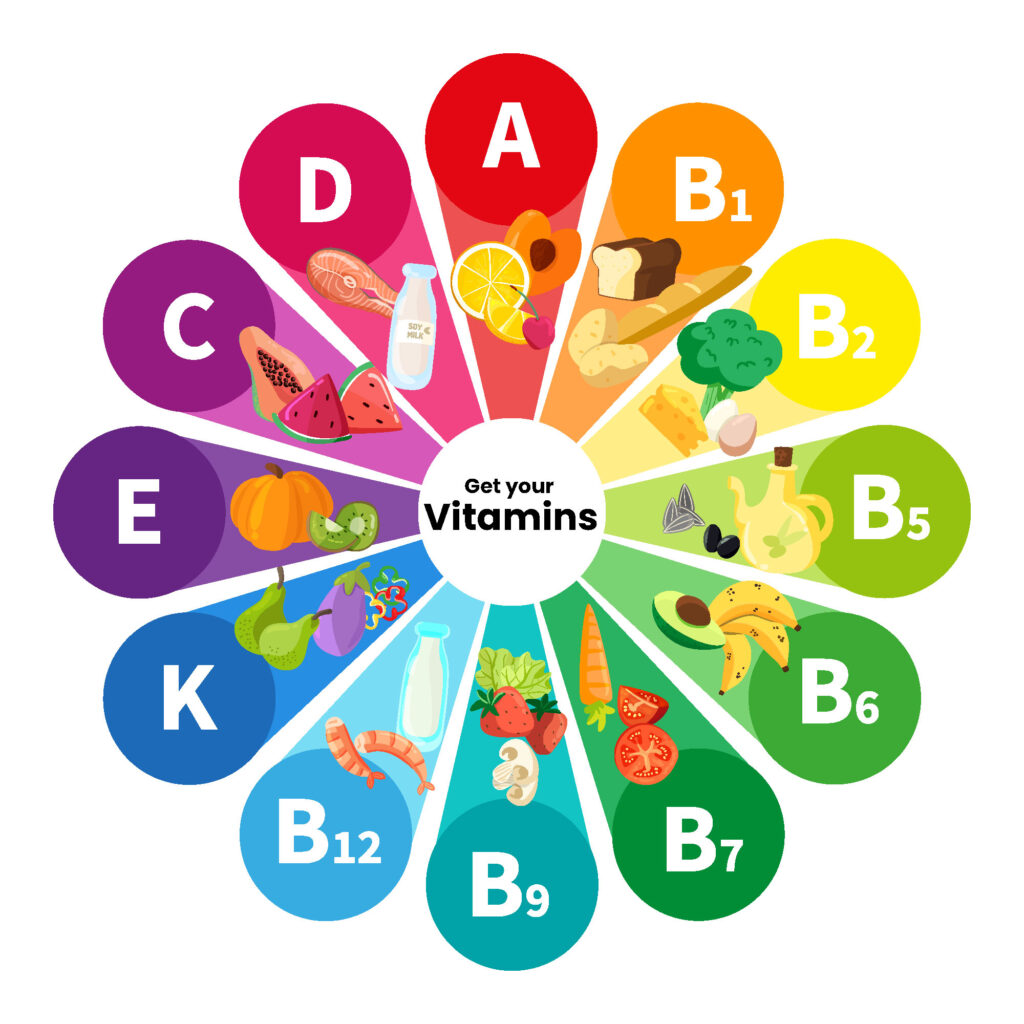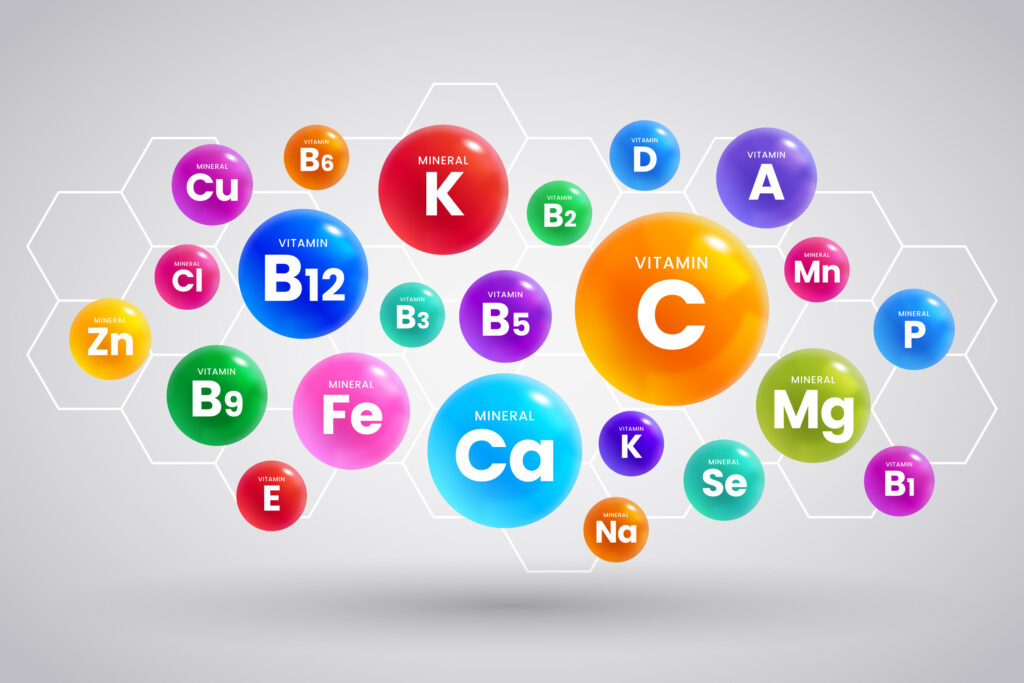
Introduction to Vitamins and Minerals:
Vitamins and minerals serve as vital nutrients necessary for the proper development and functioning of every part of the body. Vitamins and Minerals are needful in preventing and treating many mild and severe diseases. So, add fresh fruits and vegetables in your diet to maintain daily dosage that need to your body.
Vitamins:

Vitamins are organic compounds crucial for sustaining regular growth and development in the human body. Unlike carbohydrates, proteins, and fats, they don’t directly contribute energy. However, they play a pivotal role in orchestrating vital chemical reactions within the body. Vitamins can be broadly classified into two categories: water-soluble, which encompasses Vitamin C and the B-complex vitamins, and fat-soluble, which includes Vitamins A, D, E, and K.
Water-soluble vitamins, which include Vitamin C and the B-complex vitamins (like B1, B2, B3, B5, B6, B7, B9, B12), dissolve in water and are not stored in the body in significant amounts. This means they need to be replenished regularly through diet. They play essential roles in metabolism, immune function, and other processes.
Fat-soluble vitamins, which include Vitamins A, D, E, and K, are absorbed through fats in the diet and can be stored in the body’s fatty tissues. This means they can be stored for longer periods and don’t need to be consumed as frequently. They play roles in various bodily functions, such as vision (Vitamin A), bone health (Vitamin D), antioxidant protection (Vitamin E), and blood clotting (Vitamin K).
Minerals:

Minerals are essential inorganic elements that play a critical role in a wide array of physiological functions within the body. They can be categorized into two main groups: Macro Minerals and Micro Minerals. Major minerals like calcium, potassium, and magnesium are required in relatively larger quantities, whereas trace minerals such as iron, zinc, and selenium are needed in smaller, yet equally significant amounts.
Vitamins and minerals Chart list:
| VITAMINS | MINERALS |
| Vitamin A (Fat soluble) | Calcium (Macro Mineral) |
| Vitamin B1 (Water soluble) | Potassium (Macro Mineral) |
| Vitamin B2 (Water soluble) | Magnesium (Macro Mineral) |
| Vitamin B3 (Water soluble) | Iron (Micro Mineral) |
| Vitamin B5 (Water soluble) | Zinc (Micro Mineral) |
| Vitamin B6 (Water soluble) | Selenium (Micro Mineral) |
| Vitamin B7 (Water soluble) | Chloride (Micro Mineral) |
| Vitamin B9 (Water soluble) | Sulfur (Macro Mineral) |
| Vitamin B12 (Water soluble) | Copper (Micro Mineral) |
| Vitamin C (Water soluble) | Manganese (Micro Mineral) |
| Vitamin D (Fat soluble) | Iodine (Micro Mineral) |
| Vitamin E (Fat soluble) | Fluoride (Micro Mineral) |
| Vitamin K (Fat soluble) | Phosphorous (Macro Mineral) |
| Sodium (Macro Mineral) |
Role of Vitamins and Minerals in the body and food source:
Vitamins:
- Vitamin A (Retinol):
- Function: Essential for healthy vision, teeth and bones, immune function, and skin health.
- Food Sources: Eggs, carrots, sweet potatoes, papaya, spinach, kale, liver, dairy products.
- Vitamin B1 (Thiamine):
- Function: Helps convert food into energy and supports nerve function.
- Food Sources: Whole grains, nuts, seeds, pork, fish, milk, liver.
- Vitamin B2 (Riboflavin):
- Function: Involved in energy production, growth, and red blood cell formation.
- Food Sources: Dairy products, fruits, lean meats, liver, leafy greens, eggs.
- Vitamin B3 (Niacin):
- Function: Aids in energy production and DNA repair.
- Food Sources: Meat, poultry, fish, nuts, legumes, milk, peanuts, yeast, grains.
- Vitamin B5 (Pantothenic Acid):
- Function: Essential for metabolizing food and producing hormones and cholesterol.
- Food Sources: Avocado, broccoli, mushrooms, whole grains, meat, milk, yeast.
- Vitamin B6 (Pyridoxine):
- Function: Involved in brain development and function, and in the production of neurotransmitters. helps in RBC formation, Brain function, Sleep and mood, Appetit.
- Sources: Poultry, fish, potatoes, bananas, wheat, corn, cabbage, meat.
- Vitamin B7 (Biotin):
- Function: Important for skin health, fatty acid synthesis, and energy metabolism, produce hormones.
- Food Sources: Egg yolk, tomato, milk, meat, grains, nuts, sweet potatoes, spinach, liver.
- Vitamin B9 (Folate/Folic Acid):
- Function: Crucial for DNA synthesis and controls tissue growth and important during pregnancy, avoid defects like spina bifida.
- Food Sources: Leafy greens, beans, citrus fruits, fortified cereals.
- Vitamin B12 (Cobalamin):
- Function: Essential for red blood cell formation, central peripheral nervous system and neurological function , breaks fat & amino acids, reliefs anemia symptoms.
- Food Sources: Meat, fish, dairy products, liver, eggs, pork, chicken, fortified cereals.
- Vitamin C (Ascorbic Acid):
- Function: Acts as an antioxidant, absorb Iron, supports immune function, wound healing and aids in collagen production. Vitamin C is also known as ascorbic acid, a water-soluble vitamin found in fruits and vegetables.
- Food Sources: Citrus fruits, strawberries, bell peppers, broccoli.
- Vitamin D (Calciferol):
- Function: Vitamin D, a fat-soluble vitamin, supports calcium absorption in the gut, which is crucial for bone health and immune function.
- Food Sources: Sunlight (body synthesizes Vitamin D in response to sunlight), fatty fish, fortified dairy products.
- Vitamin E (Tocopherol):
- Function: Acts as an antioxidant, protects cells from damage.
- Food Sources: : Nuts, seeds, spinach, broccoli.
- Vitamin K (Phylloquinone):
- Function: Essential for blood clotting and bone health, reduces menstrual bleeding.
- Food Sources: Leafy greens, broccoli, Brussels sprouts.
Minerals:
- Calcium:
- Food Sources: Dairy products (milk, cheese, yogurt), fortified plant-based milk, leafy greens (collard greens, kale), tofu.
- Function: Integral for building and maintaining strong bones and teeth. It’s also crucial for muscle function, nerve signaling, and blood clotting.
- Potassium:
- Function: Helps regulate blood pressure, supports proper muscle and nerve function, and helps maintain fluid balance within cells.
- Food Sources: Bananas, oranges, potatoes, sweet potatoes, tomatoes, spinach, beans (especially white beans).
- Magnesium:
- Function: Supports muscle and nerve function, aids in maintaining steady heart rhythm, and helps strengthen bones, converts energy from food.
- Food Sources: Nuts (almonds, cashews), seeds (pumpkin seeds, sunflower seeds), leafy greens (spinach, kale), whole grains (brown rice, quinoa).
- Iron:
- Function: Essential for the formation of hemoglobin, which carries oxygen in the blood. It also plays a role in energy metabolism.
- Food Sources: Red meat (beef, lamb), poultry (chicken, turkey), fish (especially shellfish like oysters), beans (lentils, chickpeas), tofu, spinach.
- Zinc:
- Function: Supports immune function, wound healing, and DNA synthesis. It’s also important for proper growth and development during childhood, adolescence, and pregnancy.
- Food Sources: Meat (beef, pork, lamb), shellfish (oysters, crab), nuts (cashews, almonds), dairy products, whole grains.
- Selenium:
- Function: Serves as a protective shield for cells, acting as an antioxidant to ward off damage and fortify against infections It also plays a role in thyroid hormone metabolism, .
- Food Sources: Brazil nuts, fish (tuna, halibut), meat (beef, turkey), sunflower seeds, whole grains (wheat germ, rice).
- Phosphorus:
- Function: Works with calcium to form and maintain bone structure. It’s also involved in energy metabolism.
- Food Sources: Dairy products, meat (especially organ meats like liver), fish, poultry, nuts, whole grains.
- Sodium:
- Function: Important for maintaining proper fluid balance, blood pressure, nerve function, and muscle contractions.
- Food Sources: Table salt (sodium chloride), processed foods, canned vegetables and soups, processed meats.
- Chloride:
- Function: Works with sodium to help maintain proper fluid balance and is involved in nerve function.
- Food Sources: Table salt (sodium chloride), seaweed, some fruits and vegetables.
- Sulfur:
- Function: An essential component of certain amino acids, vitamins, and coenzymes involved in metabolic processes, protects cells from skin elasticity & shedding.
- Food Sources: Garlic, onions, cruciferous vegetables (broccoli, Brussels sprouts, cabbage), eggs, meat.
- Copper:
- Function: Plays a role in the formation of red blood cells, function of nervous system, collagen production, and helps with iron absorption.
- Food Sources: Shellfish (oysters, crab), nuts (cashews, almonds), seeds (sunflower seeds, chia seeds), organ meats (liver), beans.
- Manganese:
- Function: Acts as a cofactor for various enzymes involved in metabolism, water balance, bone formation, and antioxidant defense.
- Food Sources: Nuts (pecans, almonds), seeds (pumpkin seeds), whole grains (brown rice, oats), leafy greens.
- Iodine:
- Function: Essential for the production of thyroid hormones, which regulate metabolism, proper function of brain.
- Food Sources: Seafood (seaweed, fish), dairy products, iodized table salt.
- Fluoride:
- Function: Strengthens tooth enamel and helps prevent tooth decay.
- Food Sources: Drinking water in areas with naturally occurring fluoride, tea, fish (especially canned fish with bones).
Related Posts:
Vitamins and Minerals Deficiency:
Inadequate intake of essential nutrients can result in vitamins and minerals deficiencies, leading to a variety of health issues and diseases. Below are prevalent Vitamins and Minerals deficiencies along with their corresponding symptoms:
- Vitamin A Deficiency:
- Symptoms: Night blindness, dry eyes, skin issues, impaired immune function.
- Vitamin B1 (Thiamine) Deficiency:
- Symptoms: Fatigue, muscle weakness, beriberi (nerve damage), memory loss, cardiovascular problems. Helps body to convert carbs to energy,
- Vitamin B2 (Riboflavin) Deficiency:
- Symptoms: Growth failure, Cracked lips, inflammation of the lining of the mouth and tongue, skin disorders.
- Vitamin B3 (Niacin) Deficiency:
- Symptoms: Pellagra (diarrhea, dermatitis, dementia), inflamed skin, mouth sores and red tongue.
- Vitamin B5 (Pantothenic Acid) Deficiency:
- Symptoms: Fatigue, weakness, digestive issues, skin problems. Metabolism and food production of harmones & cholesterol.
- Vitamin B6 (Pyridoxine) Deficiency:
- Symptoms: Anemia, depression, skin disorders, seizure disorder, weak immune system.
- Vitamin B7 (Biotin) Deficiency:
- Symptoms: Hair loss, skin rash, brittle nails, neurological symptoms.
- Vitamin B9 (Folate/Folic Acid) Deficiency:
- Symptoms: Anemia, fatigue, neural tube defects in infants (if deficiency occurs during pregnancy).
- Vitamin B12 (Cobalamin) Deficiency:
- Symptoms: Anemia, weakness, fatigue, nerve damage, difficulty walking.
- Vitamin C Deficiency:
- Symptoms: Scurvy (bleeding gums, skin spots, fatigue), poor wound healing, weakened immune system.
- Vitamin D Deficiency:
- Symptoms: Weak bones (osteoporosis), increased risk of fractures, muscle weakness.
- Vitamin E Deficiency:
- Symptoms: Anemia, Peripheral neuropathy, muscle weakness, vision problems.
- Vitamin K Deficiency:
- Symptoms: Hemorrhage, Increased bleeding and bruising, impaired wound healing.
- Iron Deficiency:
- Symptoms: Anemia (fatigue, weakness, pale skin), brittle nails, restless legs syndrome.
- Zinc Deficiency:
- Symptoms: Impaired immune function, delayed wound healing, hair loss, skin problems.
- Selenium Deficiency:
- Symptoms: Weakness, fatigue, hair loss, weakened immune system.
- Calcium Deficiency:
- Symptoms: Weak bones (osteoporosis), tooth decay, muscle cramps.
- Potassium Deficiency:
- Symptoms: Muscle weakness, fatigue, irregular heart rhythms, high blood pressure.
It’s important to maintain a balanced diet to ensure you receive an adequate supply of these essential nutrients Vitamins and Minerals. If you suspect a Vitamins and Minerals deficiency, it’s crucial to seek advice from a healthcare professional for proper diagnosis and treatment. They may recommend dietary changes or supplements, depending on the severity of the Vitamins and Minerals deficiency.
Vitamins and Minerals Dosage:
The recommended daily dosage of vitamins and minerals can vary based on factors such as age, gender, individual health status, and specific dietary needs. Here are some general guidelines for daily intake of common vitamins and minerals for adults:
| VITAMINS | DAILY DOSAGE |
| Vitamin A | RDA): 700 – 900 micrograms (mcg) for men; 600 – 700 mcg for women |
| Vitamin B1 (Thiamine) | RDA: 1.2 – 1.4 milligrams (mg) for men; 1.1 – 1.1 mg for women |
| Vitamin B2 (Riboflavin) | RDA: 1.3 – 1.6 mg for men; 1.1 – 1.3 mg for women |
| Vitamin B3 (Niacin) | RDA: 16 – 18 mg for men; 14 – 16 mg for women |
| Vitamin B5 (Pantothenic Acid) | Adequate Intake (AI): 5 mg for both men and women |
| Vitamin B6 (Pyridoxine) | RDA: 1.3 – 1.7 mg for adults |
| Vitamin B7 (Biotin) | AI: 30 micrograms (mcg) for both men and women |
| Vitamin B9 (Folate/Folic Acid) | RDA: 400 – 600 mcg for adults |
| Vitamin B12 (Cobalamin) | RDA: 2.4 mcg for both men and women |
| Vitamin C | RDA: 75 – 90 milligrams (mg) for women; 90 – 120 mg for men |
| Vitamin D | RDA: 600 – 800 International Units (IU) for adults under 70; 800 – 1000 IU for adults over 70 |
| Vitamin E | RDA: 15 milligrams (mg) for both men and women |
| Vitamin K | AI: 90 – 120 mcg for women 120 – 150 mcg for men |
| VITAMINS | DAILY DOSAGE |
| Calcium | RDA: 1000 – 1200 milligrams (mg) for adults |
| Potassium | AI: 2,600 – 3,400 mg for women; 3,000 – 3,800 mg for men |
| Magnesium | RDA: 310 – 420 mg for women; 400 – 420 mg for men |
| Iron | RDA: 18 mg for women; 8 mg for men |
| Zinc | RDA: 8 – 11 mg for women; 11 – 16 mg for men |
| Selenium | RDA: 55 – 70 mcg for adults |
| Phosphorus | RDA: 700 – 1,250 mg for adults |
| Sodium | Adequate Intake (AI): 1,500 – 2,300 mg for adults |
Conclusion:
A balanced diet that includes a variety of fruits, vegetables, whole grains, lean proteins, and healthy fats typically provides an adequate supply of vitamins and minerals. However, in certain cases or due to specific dietary restrictions, supplements might be recommended under the guidance of a healthcare professional. It’s important to note that excessive intake of certain vitamins can also have negative effects, so balance is key.

Some really superb info , Sword lily I found this.
thank you. check more info.. suggest more topics
Just wanna remark on few general things, The website style is ideal, the topic matter is rattling good
thank you
I enjoyed reading your piece and it provided me with a lot of value.
May I request that you elaborate on that? Your posts have been extremely helpful to me. Thank you!
I want to thank you for your assistance and this post. It’s been great.
Sustain the excellent work and producing in the group!
I really appreciate your help
Good web site! I truly love how it is easy on my eyes and the data are well written. I am wondering how I could be notified whenever a new post has been made. I’ve subscribed to your RSS which must do the trick! Have a nice day!
May I request more information on the subject? All of your articles are extremely useful to me. Thank you!
Your articles are extremely helpful to me. Please provide more information!
May I request more information on the subject? All of your articles are extremely useful to me. Thank you!
Thank you for your help and this post. It’s been great.
I抎 should check with you here. Which isn’t one thing I usually do! I take pleasure in reading a post that can make people think. Additionally, thanks for permitting me to remark!
I抳e learn some good stuff here. Certainly value bookmarking for revisiting. I wonder how so much attempt you set to create this type of great informative website.
You’re so polished!